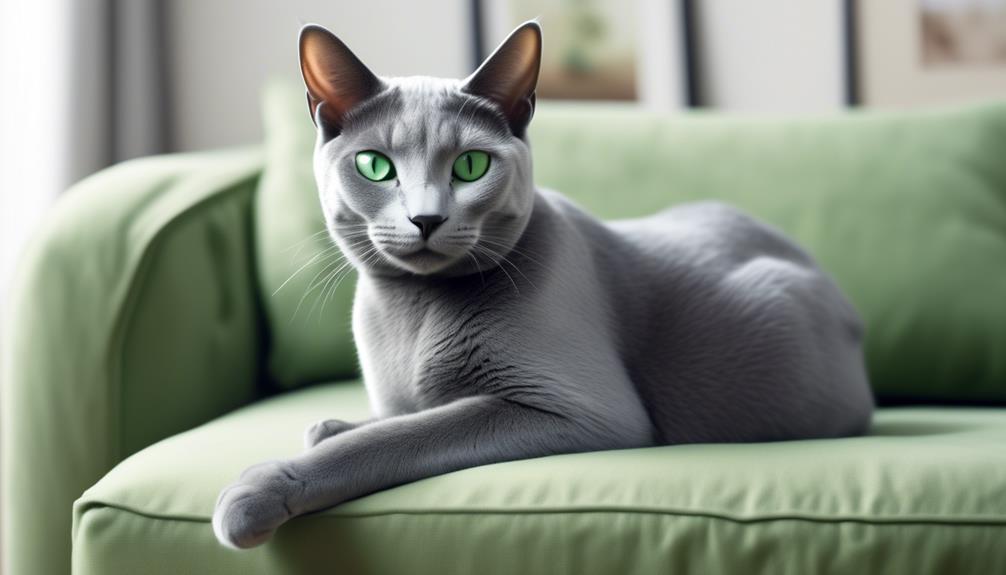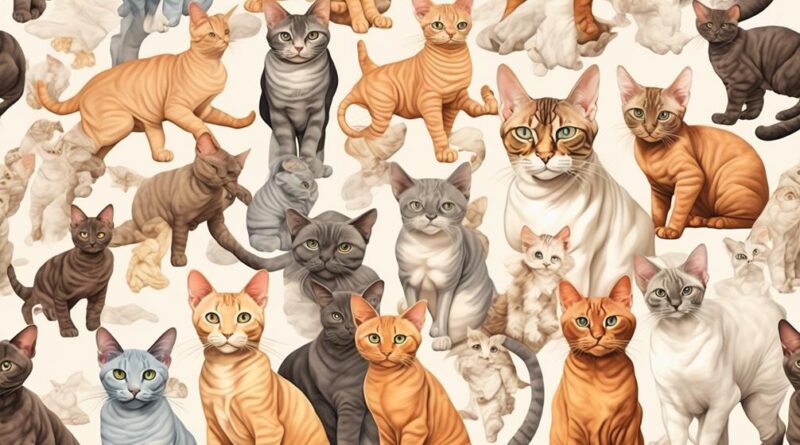9 Best Hypoallergenic Cat Breeds for Families
Are you tired of constantly sneezing and itching whenever you're around cats, but still want to enjoy the company of a feline friend? There are several hypoallergenic cat breeds that might just be the solution you've been searching for.
These breeds are known for producing fewer allergens and can be a great addition to your family. But before you make a decision, there are a few things you should consider…
Siberian
If you're looking for a hypoallergenic cat breed, the Siberian may be the perfect choice for your family. Siberian cats have a thick, water-resistant triple coat that helps reduce the spread of allergens. Their grooming requirements are moderate, with a weekly brushing session being sufficient to keep their coat in good condition. This not only helps in reducing shedding but also minimizes the presence of allergens in the environment.
The allergen levels in Siberian cat fur are lower compared to many other cat breeds. The protein responsible for most cat allergies is Fel d 1, and Siberian cats produce lower levels of this allergen. Although no cat breed is completely hypoallergenic, many allergy sufferers find that they can tolerate being around Siberian cats without experiencing severe allergic reactions. Regular grooming and cleaning the cat's environment can further help reduce allergen levels, making it more comfortable for allergy-prone individuals to coexist with a Siberian cat.
When it comes to grooming, Siberian cats are relatively low maintenance. Their coat is designed to withstand harsh weather conditions, and as a result, they require minimal grooming. A weekly brushing with a good quality comb or brush will help in keeping their coat healthy and reduce the spread of allergens. Additionally, maintaining a clean living environment can further minimize allergens and help allergy sufferers cohabit comfortably with their Siberian feline companion.
Balinese
The Siberian cat's reduced allergen levels make it an appealing choice for allergy sufferers. Another breed known for its hypoallergenic qualities is the Balinese.
When considering a Balinese cat as a pet, here are some essential factors to keep in mind:
- Grooming tips for Balinese cats:
- Balinese cats have a single coat that lacks an undercoat. This means they shed less and produce fewer allergens than other breeds.
- Regular grooming is essential to keep their coat healthy and reduce shedding.
- Brush your Balinese cat weekly to remove loose hair and prevent mats.
- Additionally, frequent nail trimming, ear cleaning, and dental care are important to maintain their overall health and hygiene.
- Health considerations for Balinese breed:
- Although Balinese cats are generally healthy, they may be prone to certain genetic conditions.
- These can include heart issues such as hypertrophic cardiomyopathy and a condition known as endocardial fibroelastosis.
- Regular veterinary check-ups are crucial to monitor their heart health.
- Additionally, like all cats, they should be vaccinated, spayed or neutered, and provided with a balanced diet to support their overall well-being.
When considering a hypoallergenic cat breed for your family, the Balinese is a great option due to its reduced allergen levels. By following proper grooming practices and staying attentive to their health, you can ensure that your Balinese cat remains a happy and healthy member of your household.
Devon Rex
Regularly praised for its unique appearance and playful personality, the Devon Rex is a popular choice for families seeking a hypoallergenic cat breed. Known for its short, curly coat, the Devon Rex sheds very little, making it a great option for allergy sufferers. When it comes to grooming needs, the Devon Rex is relatively low-maintenance. Its coat requires minimal grooming, with occasional bathing to remove excess oils and reduce shedding. Their ears may need regular cleaning to prevent wax buildup, but overall, they aren't high-maintenance in the grooming department.
In terms of temperament and behavior, the Devon Rex is often described as mischievous and energetic. They're highly sociable cats, often seeking out attention and interaction with their human family members. This breed is known for its intelligence and curiosity, often getting into playful antics to entertain themselves and their families. Their playful and outgoing nature makes them great companions for families with children or other pets. Additionally, they're known to be quite adaptable and can easily adjust to new environments and routines.
Javanese
Praised for their affectionate nature and minimal shedding, Javanese cats are an excellent choice for families with allergies, just like the Devon Rex. If you're considering adding a Javanese cat to your family, here are a few key points to keep in mind:
- Grooming requirements
Javanese cats have a semi-long, silky coat that requires regular grooming to prevent tangles and mats. Despite their luxurious fur, they aren't high-maintenance when it comes to grooming. A weekly brushing session is usually sufficient to keep their coat in good condition. This grooming routine not only helps to minimize shedding but also provides a bonding opportunity between you and your feline friend.
- Temperament and personality
Known for their social and affectionate nature, Javanese cats thrive on human companionship. They're often described as being friendly, outgoing, and intelligent. These cats enjoy interactive play and are known to be quite vocal, expressing themselves with soft, melodious voices. Javanese cats are also highly adaptable and can adjust well to different living situations, making them a great fit for families with children and other pets.
With their loving and sociable disposition, along with their low-shedding coat, Javanese cats make wonderful companions for families seeking a hypoallergenic feline friend.
Cornish Rex
Considering adding a Cornish Rex cat to your family? You'll be pleased to know that these playful and affectionate felines are one of the best hypoallergenic cat breeds for families. With their unique curly coats, Cornish Rex cats have minimal shedding, making them an excellent choice for allergy sufferers. When it comes to grooming, the Cornish Rex requires regular but gentle brushing to remove loose hair and distribute skin oils. Their short, wavy fur should be cared for with a soft brush or a chamois cloth to maintain its distinctive texture. Due to their highly active nature, they may benefit from a high-quality diet to support their energy levels and overall health.
In terms of personality traits, Cornish Rex cats are known for their outgoing and affectionate nature. They're often described as 'dog-like' due to their tendency to form strong bonds with their human family members. These sociable cats enjoy being involved in daily activities and are particularly fond of interactive play. They thrive on attention and are likely to follow you around the house, seeking opportunities to participate in whatever you're doing. Their playful and curious demeanor makes them great companions for children and other pets. However, it's important to provide them with plenty of mental and physical stimulation to prevent boredom. Overall, the Cornish Rex is a delightful addition to any family looking for a hypoallergenic and engaging feline companion.
Sphynx
If you've enjoyed the low-shedding and affectionate nature of the Cornish Rex, the Sphynx cat breed may pique your interest with its unique hairless appearance and sociable personality.
Sphynx Cat Breed
- Grooming Needs
The Sphynx may be hairless, but that doesn't mean they're maintenance-free. Due to their lack of fur, they need regular bathing to remove the build-up of oils on their skin. Additionally, their large ears require frequent cleaning to prevent wax build-up and potential infections. It's essential to keep them warm after baths as they lack the insulating layer of fur, making them susceptible to temperature changes.
- Temperament and Personality
Despite their unusual appearance, Sphynx cats are known for their affectionate and outgoing nature. They thrive on attention and are often found perched on their owner's lap or shoulder. These cats are highly social and enjoy interacting with humans and other pets. They're playful and energetic, making them great companions for families with children. Sphynx cats are known for their entertaining antics and are often described as having dog-like personalities due to their loyalty and tendency to follow their owners around.
Russian Blue

The elegance and intelligence of the Russian Blue cat breed make it a popular choice for families seeking a low-allergen pet. With their gentle and reserved nature, Russian Blues are known for being affectionate and loyal to their human companions. They're often cautious around strangers but form strong bonds with their family members, making them excellent companions for children and adults alike. The Russian Blue temperament is typically calm and composed, and they're known for being playful yet not overly demanding, making them an ideal addition to any household.
When it comes to grooming, Russian Blues require minimal maintenance. Their short, dense coat only requires weekly brushing to remove loose hair and distribute skin oils, which contributes to their hypoallergenic qualities. Additionally, regular nail trimming and dental care are essential to keep your Russian Blue healthy and happy. Their striking green eyes and plush blue-gray coat are truly distinctive features of this breed, and with a little grooming, they'll always look their best.
Oriental
With their sleek and slender build, Oriental cats are known for their striking appearance and lively personalities. If you're considering an Oriental cat as a hypoallergenic pet for your family, here's what you need to know:
- Oriental cat breeds: Temperament and grooming needs:
Oriental cats are highly intelligent and social. They thrive on human interaction and are known for being vocal and affectionate. Their short, fine coat requires minimal grooming, making them a low-maintenance choice for allergy sufferers. Regular brushing and occasional baths can help reduce allergens.
- Oriental cat breeds: Compatibility with children and other pets:
Orientals are generally good with children and other pets. Their playful and active nature makes them great companions for kids, and they often enjoy interactive play. However, it's important to supervise interactions to ensure that both the cat and the children or other pets are comfortable and safe. Early socialization can help Orientals adapt well to living with other animals.
Frequently Asked Questions
What Are the Typical Grooming Needs for These Hypoallergenic Cat Breeds?
To maintain the coat of hypoallergenic cat breeds, you'll want to brush regularly to reduce shedding. Use grooming products designed for sensitive skin. Follow hypoallergenic grooming tips to keep your cat's coat clean and allergy-friendly.
Are There Any Specific Health Concerns or Genetic Predispositions for These Breeds?
You should be aware of specific health concerns and genetic predispositions for these breeds. Regular vet check-ups and allergy management are crucial. Consistent grooming and shedding control can help minimize allergens in your home.
Do These Hypoallergenic Cat Breeds Tend to Be More or Less Vocal Than Other Breeds?
If you're considering hypoallergenic cat breeds, it's helpful to know their vocal tendencies. Some hypoallergenic breeds are less vocal, which can be beneficial for managing allergen levels and fitting into family dynamics.
How Do These Breeds Typically Interact With Children and Other Pets in the Household?
Typically, hypoallergenic cat breeds are known for their gentle and friendly behavior, making them great companions for children and other pets. They're generally well-suited for households with allergies in children and require proper socialization with kids.
Are There Any Specific Dietary Requirements or Recommendations for These Hypoallergenic Cat Breeds?
If you're considering a hypoallergenic cat breed, there are a few dietary restrictions and grooming tips to keep in mind. Look for allergy-friendly food and consider regular grooming to help control shedding.
Conclusion
So there you have it – if you're looking for a hypoallergenic cat breed that's great for families, consider one of these top 9 options.
From the low-shedding Siberian to the playful Javanese, there's a hypoallergenic cat out there for everyone.
With the right care and attention, you can enjoy the company of a furry feline friend without the worry of allergies.
Happy cat hunting!
